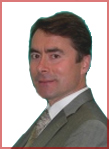Jean-Marc Fourre (AXA IM): ‘We have quarterly training on risk governance. Through this we can ensure that this risk management culture will continue’
While Axa Investment Managers has always had a risk function, the effect of the financial crisis has led the firm to make three key enhancements. The first of these involved strengthening the ties between all the risk managers and creating the new role of senior expertise risk managers (serms). “There were investment risk managers on one side and operational risk managers on another,” says Fourre. “We were too segregated and not always able to take a global view of our risks, which is the purpose of the serm, for their respective expertise.”
Axa Investment Managers also tried to focus on the risks that had been overlooked in the years prior to the financial crisis, including risk to do with over-the-counter (OTC) instruments. “We have increased our coverage of liquidity risk – particularly for the less liquid assets we hold such as OTC derivative contracts, counterparty and collateral risk as a result of Lehman Brothers – and increased coverage of concentration risk and modelling risk. We have always used VaR [value at risk] but now we are paying more attention to stress tests and to modelling extreme events.”
The third area that Axa has focused on is making risk management more accessible to senior management. “We found that we needed to get the regular attention of the board. In the past there were a lot of different risk committees, but when market conditions became difficult, it was hard to focus on specific risks.” The new governance around risk committees makes this easier, says Fourre.
There are now three main risk and control committees. The first is a weekly global risk committee chaired by the head of all control functions and involving all of the top management. This committee looks at the risks facing the company as a whole.
The second committee has a similar structure to the first but focuses purely on risks resulting from new business.
The third committee meets quarterly and comprises the management board. Its role is to look at all risks on a consolidated and global level.
“This new governance enables us to focus on specific risk issues and, with the weekly committee meetings, enables us to get an immediate view on our consolidated risks and to be able to act much more quickly,” says Fourre. “We can detect risk issues, set internal trading limits, detect breach of alert levels and submit these to a committee for a decision. The quick reaction time is critical because market conditions are still challenging.”
The attention given to the risk management function has also highlighted just what a complex role it has become, not least in how it fits into the organisation as a whole.
“Our role is two-fold. Firstly we are a control function that operates independently from the fund managers, but we have also seen the need to work more closely with the fund managers so that we can anticipate and act on risks before they arise,” says Fourre. “So for instance when we are defining or monitoring internal limits we can discuss it with the portfolio managers and make sure that we fully understand the risk profile of the fund.”
He adds: “We are also using the crisis to ensure a better risk management culture so that every Axa Investment Managers employee is conscious that risk management is their responsibility too. We have quarterly training on risk governance and risk techniques. Through this we can ensure that even when conditions improve, this risk management culture will continue.”
The firm’s head count for risk management has increased by 20% in the last two years, most notably in those areas where it has added risk experts for each part of the business and in each region.
“It was not easy to recruit these experts and we had to look outside of the fund management world in many cases, such as the prop trading desks at the investment banks where there is much more experience of stress tests and advanced modelling. Ideally these experts working within the global risk management function will be able to share their expertise and their experience and continually communicate across the business…
“For example, we are available to accompany sales staff when they visit clients in order to explain the risk management approach of the company. In this regard, risk management is becoming a valuable marketing tool. With the RFPs we are getting now, they are asking us to provide more detailed and extensive information on our risk management – the specific systems that we use, how we calibrate our daily VaR and so on.”
For the future, Fourre says his firm is looking to improve risk management in two other key areas. “We want to be even more proactive and able to anticipate risk. We produce regular ‘insomnia’ reports for the top management so that they can be aware of what the main areas of risk are.
“Back in September we highlighted interest rate risk and sovereign risk. And in June we will be running another set of tests on liquidity as we feel this is still an important issue.
“The second area we are focusing on is enhancing our dashboard, which provides the senior management with a consolidated view of all of the risks facing us, both on account of our clients and on our own account.”
©2010 funds europe





